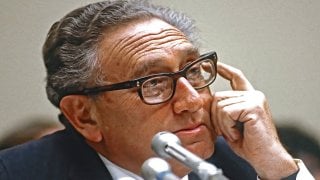Graham Allison: How Henry Kissinger Shaped My Life
I entered Henry Kissinger’s classroom at Harvard University 58 years ago, in 1965. Indeed, I have been learning from him ever since.
Giving Back
In the decades since Kissinger left Washington, he gave me repeated opportunities to join him in collaborative ventures. In one of the most meaningful for him as a son of Germany, we conspired in creating at Harvard’s John F. Kennedy School of Government an analog of the Rhodes Scholarship at Oxford—but for Germans. Named the McCloy Scholars Program in honor of the great wartime leader and post-war High Commissioner in rebuilding Germany, this program continues to bring ten remarkable German students to Harvard every year. Alumni of the program now number in the hundreds and play key roles in German society. The story of how together we persuaded McCloy to endorse the proposal and then the German Volkswagen Foundation to fund it includes many twists and turns and would take us too far afield for the purposes of this article.
Leaders, Leadership and AI
Just last year, Henry published a remarkable book titled Leadership. In it, he offers penetrating profiles of 6 transformative leaders he knew first-hand. Successive chapters analyze Konrad Adenauer: the strategy of humility; Charles de Gaulle: the strategy of will; Richard Nixon: the strategy of equilibrium; Anwar Sadat: the strategy of transcendence; Lee Kuan Yew: the strategy of excellence; and Margaret Thatcher: the strategy of conviction. In each case study, he begins with the structural realities but then shows how “within human institutions—states, religions, armies, companies, schools—leadership is needed to help people reach from where they are to where they have never been, and sometimes, can scarcely imagine going.”
Finally, the challenge that had excited Henry most in the past five years was AI. When he first told me that this was the big new thing we needed to try to get our minds around, I offered my view that this was a bridge too far for folks like him and me who were not scientific and technical experts. But he was not to be dissuaded. Fortunately, Eric Schmidt, the former Google CEO who led the company into the AI world, became a generous tutor for Henry—and also for me. Over the past two years, Henry and I co-chaired a small, high-level AI seminar that has been wrestling with what I call the “Kissinger question.” Specifically, he pressed the group to consider whether and how the most potentially catastrophic applications of AI can be constrained. Members of the group include leading practitioners and thinkers in AI: Eric Schmidt, Mustafa Suleyman, Reid Hoffman, Craig Mundie, and James Manyika. Insights from the group’s deliberations are evident in recent books published by Mustafa and Reid, as well as the book that Eric and Henry have been writing over the past year. In the Foreign Affairs article Henry and I published in October—“The Path to AI Arms Control: America and China Must Work Together to Avert Catastrophe”—we explore ways in which lessons learned over almost eight decades of the nuclear era can illuminate the challenge posed by AI today. We also urged Presidents Biden and Xi to meet face-to-face for a serious, extended discussion of AI arms control, recognizing their special obligation and opportunity to act now to constrain the most dangerous potential applications of this technology. When this happened at the meeting between the two Presidents in San Francisco last month and they agreed to establish a US-China working group to explore AI’s dangers and opportunities, this gave him some satisfaction.
In sum. among the many things for which I am thankful has been the opportunity to learn from an amazing individual, an amazing mind, and an amazing life. As we mourn his passing, we can be inspired by the lessons he taught us and the writings he’s left us, from which we can continue to learn.
About the Author
Dr. Graham Allison is the Douglas Dillon Professor of Government at Harvard University, where he has taught for five decades. Allison is a leading analyst of national security with special interests in nuclear weapons, Russia, China, and decision-making. Allison was the “Founding Dean” of Harvard’s John F. Kennedy School of Government, and until 2017, served as Director of its Belfer Center for Science and International Affairs which is ranked the “#1 University Affiliated Think Tank” in the world.
All images are Shutterstock.

